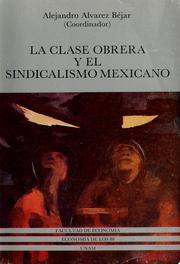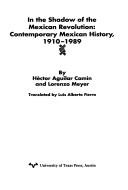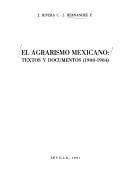| Listing 1 - 10 of 30 | << page >> |
Sort by
|

ISBN: 9683611877 9789683611871 Year: 1990 Publisher: México, D.F.: Universidad Nacional Autónoma de México, Facultad de Economía,
Abstract | Keywords | Export | Availability | Bookmark
 Loading...
Loading...Choose an application
- Reference Manager
- EndNote
- RefWorks (Direct export to RefWorks)
Book
Year: 1971 Publisher: London ; Reading ; Sydney [etc.] Addison-Wesley
Abstract | Keywords | Export | Availability | Bookmark
 Loading...
Loading...Choose an application
- Reference Manager
- EndNote
- RefWorks (Direct export to RefWorks)
Book
ISBN: 9781477311721 1477311726 9781477311738 1477311734 9781477310748 1477310746 9781477310755 1477310754 Year: 2017 Publisher: University of Texas Press
Abstract | Keywords | Export | Availability | Bookmark
 Loading...
Loading...Choose an application
- Reference Manager
- EndNote
- RefWorks (Direct export to RefWorks)
In the twenty years of postrevolutionary rule in Mexico, the war remained fresh in the minds of those who participated in it, while the enigmas of the revolution remained obscured. Demonstrating how textuality helped to define the revolution, Culture and Revolution examines dozens of seemingly ahistorical artifacts to reveal the radical social shifts that emerged in the war's aftermath. Presented thematically, this expansive work explores radical changes that resulted from postrevolution culture, including new internal migrations; a collective imagining of the future; popular biographical narratives, such as that of the life of Frida Kahlo; and attempts to create a national history that united indigenous and creole elite society through literature and architecture. While cultural production in early twentieth-century Mexico has been well researched, a survey of the common roles and shared tasks within the various forms of expression has, until now, been unavailable. Examining a vast array of productions, including popular festivities, urban events, life stories, photographs, murals, literature, and scientific discourse (including fields as diverse as anthropology and philology), Horacio Legrás shows how these expressions absorbed the idiosyncratic traits of the revolutionary movement.Tracing the formation of modern Mexico during the 1920s and 1930s, Legrás also demonstrates that the proliferation of artifacts - extending from poetry and film production to labor organization and political apparatuses - gave unprecedented visibility to previously marginalized populations, who ensured that no revolutionary faction would unilaterally shape Mexico's historical process during these formative years.
Collective memory - Mexico - History - 20th century. --- Collective memory --- History --- Mexico --- Influence.
Multi
ISBN: 9781477311721 1477311726 Year: 2021 Publisher: Austin, Tex. University of Texas Press
Abstract | Keywords | Export | Availability | Bookmark
 Loading...
Loading...Choose an application
- Reference Manager
- EndNote
- RefWorks (Direct export to RefWorks)
In the twenty years of postrevolutionary rule in Mexico, the war remained fresh in the minds of those who participated in it, while the enigmas of the revolution remained obscured. Demonstrating how textuality helped to define the revolution, Culture and Revolution examines dozens of seemingly ahistorical artifacts to reveal the radical social shifts that emerged in the war's aftermath. Presented thematically, this expansive work explores radical changes that resulted from postrevolution culture, including new internal migrations; a collective imagining of the future; popular biographical narratives, such as that of the life of Frida Kahlo; and attempts to create a national history that united indigenous and creole elite society through literature and architecture. While cultural production in early twentieth-century Mexico has been well researched, a survey of the common roles and shared tasks within the various forms of expression has, until now, been unavailable. Examining a vast array of productions, including popular festivities, urban events, life stories, photographs, murals, literature, and scientific discourse (including fields as diverse as anthropology and philology), Horacio Legrás shows how these expressions absorbed the idiosyncratic traits of the revolutionary movement.Tracing the formation of modern Mexico during the 1920s and 1930s, Legrás also demonstrates that the proliferation of artifacts - extending from poetry and film production to labor organization and political apparatuses - gave unprecedented visibility to previously marginalized populations, who ensured that no revolutionary faction would unilaterally shape Mexico's historical process during these formative years.
History --- Collective memory - Mexico - History - 20th century. --- Collective memory --- Mexico --- Influence.
Book
ISBN: 9707016566 9789707016569 Year: 2005 Publisher: México, D.F.: Cámara de Diputados, LIX Legislatura,
Abstract | Keywords | Export | Availability | Bookmark
 Loading...
Loading...Choose an application
- Reference Manager
- EndNote
- RefWorks (Direct export to RefWorks)
Employers and workers organisations --- anno 1900-1999 --- anno 2000-2009 --- Mexico --- Labor unions --- Syndicalism --- History --- Political activity --- Labor unions - Mexico - History - 20th century --- Labor unions - Political activity - Mexico --- Syndicalism - Mexico - History - 20th century
Book
ISBN: 0803214588 9780803214583 Year: 1992 Publisher: Lincoln (Nebr.): University of Nebraska press,
Abstract | Keywords | Export | Availability | Bookmark
 Loading...
Loading...Choose an application
- Reference Manager
- EndNote
- RefWorks (Direct export to RefWorks)
Communism --- Socialism --- History --- Partido Comunista Mexicano --- Mexico --- Mexique --- Politics and government --- Politique et gouvernement --- 20th century --- Partido Communista Mexicano --- History. --- Communism - Mexico - History - 20th century. --- Socialism - Mexico - History - 20th century.

ISBN: 0292704518 0292704461 0292757077 Year: 1993 Publisher: Austin University of Texas Press
Abstract | Keywords | Export | Availability | Bookmark
 Loading...
Loading...Choose an application
- Reference Manager
- EndNote
- RefWorks (Direct export to RefWorks)
Hector Aguilar Camín and Lorenzo Meyer, two of Mexico's leading intellectuals, set out to fill a void in the literature on Mexican history: the lack of a single text to cover the history of contemporary Mexico during the twentieth century. A la sombra de la Revolucion Mexicana, now available in English as In the Shadow of the Mexican Revolution, covers the Mexican Revolution itself, the gradual consolidation of institutions, the Cardenas regime, the "Mexican economic miracle" and its subsequent collapse, and the recent transition toward a new historical period. The authors offer a comprehensive and authoritative study of Mexico's turbulent recent history, a history that increasingly intertwines with that of the United States. Given the level of interest in Mexico--likely to increase still more as a result of the recent liberalization of trade policies--this volume will be useful in affording U.S. readers an intelligent, comprehensive, and accessible study of their neighbor to the south.
History of Mexico --- anno 1900-1999 --- Mexico --- Mexique --- History --- Histoire --- Mexico--History--20th century. --- HISTORY / Latin America / Mexico.
Book
ISBN: 9701879872 9789701879872 9789701879870 Year: 2002 Publisher: México: Instituto Politécnico Nacional,
Abstract | Keywords | Export | Availability | Bookmark
 Loading...
Loading...Choose an application
- Reference Manager
- EndNote
- RefWorks (Direct export to RefWorks)

ISBN: 8400072065 9788400072063 Year: 1991 Volume: 359 Publisher: Sevilla: Escuela de estudios hispano-americanos,
Abstract | Keywords | Export | Availability | Bookmark
 Loading...
Loading...Choose an application
- Reference Manager
- EndNote
- RefWorks (Direct export to RefWorks)
History of Mexico --- anno 1900-1999 --- Land reform --- Réforme agraire --- History --- Sources. --- Histoire --- Sources --- Réforme agraire --- Land reform - Mexico - History - 20th century - Sources.
Book
ISBN: 9780521846417 9780521608879 9780511790683 9780511415241 0511415249 0521846412 0521608872 0511414560 9780511414565 0511790686 9786611775506 6611775501 9780511412950 0511412959 9780511412950 110717547X 1281775509 0511412029 0511413874 9781281775504 9780511412028 9780511413872 Year: 2008 Publisher: Cambridge: Cambridge university press,
Abstract | Keywords | Export | Availability | Bookmark
 Loading...
Loading...Choose an application
- Reference Manager
- EndNote
- RefWorks (Direct export to RefWorks)
This book addresses two questions that are crucial to understanding Mexico's current economic and political challenges. Why did the opening up of the economy to foreign trade and investment not result in sustained economic growth? Why has electoral democracy not produced rule of law? The answer to those questions lies in the ways in which Mexico's long history with authoritarian government shaped its judicial, taxation, and property rights institutions. These institutions, the authors argue, cannot be reformed with the stroke of a pen. Moreover, they represent powerful constraints on the ability of the Mexican government to fund welfare-enhancing reforms, on the ability of firms and households to write contracts, and on the ability of citizens to enforce their basic rights.
Social policy --- Economic policy and planning (general) --- Internal politics --- Mexico --- Authoritarianism --- Democratization --- History --- Democratic consolidation --- Democratic transition --- Political science --- New democracies --- Authority --- Social Sciences --- Political Science --- Mexico - History - 1988 --- -Authoritarianism - Mexico - History - 20th century --- Democratization - Mexico - History - 20th century --- Mexico - History - 1970-1988
| Listing 1 - 10 of 30 | << page >> |
Sort by
|

 Search
Search Feedback
Feedback About UniCat
About UniCat  Help
Help News
News